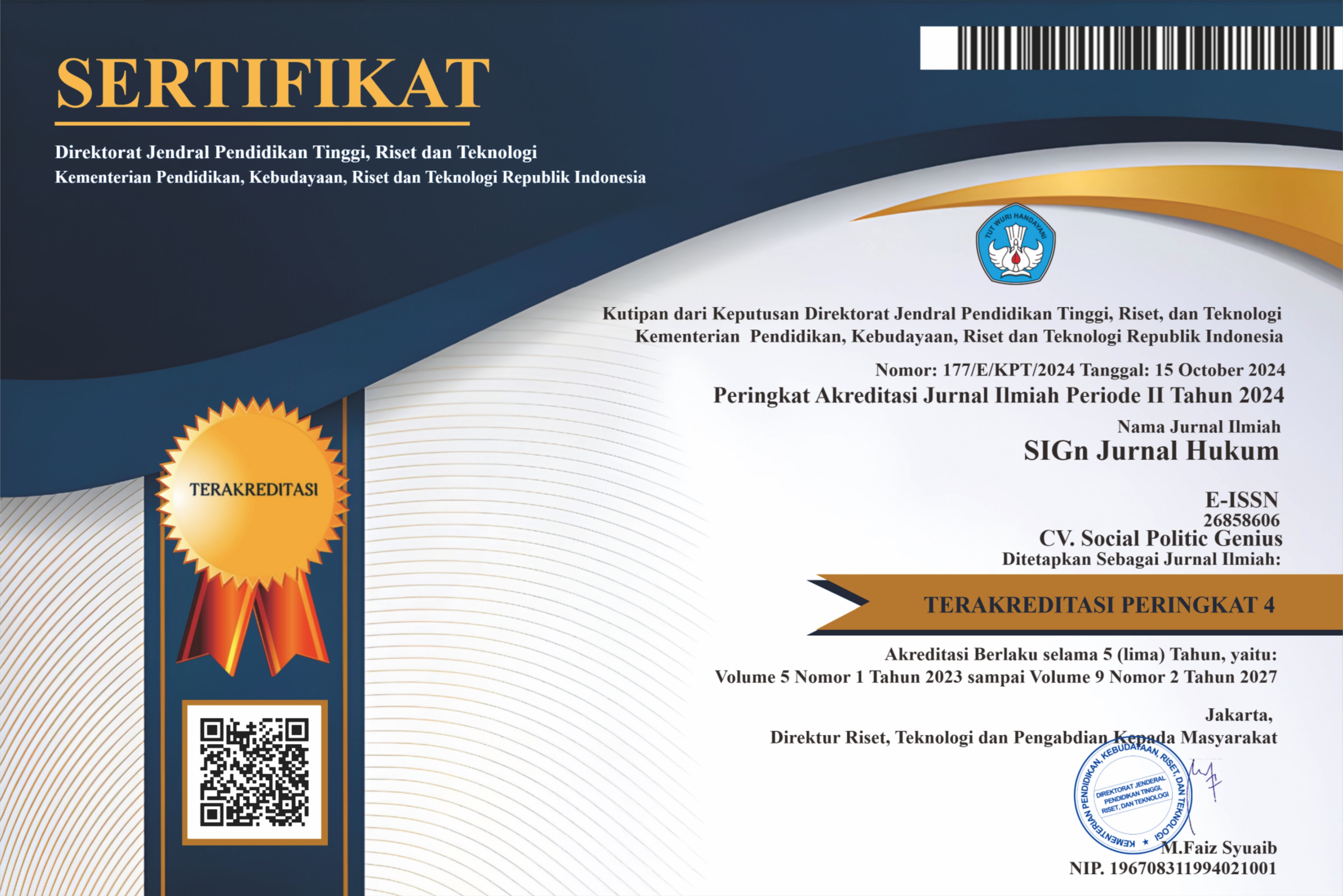The Paradox of Rebus Sic Stantibus Principle: The Dialectic between Stability and Flexibility in Contemporary International Treaty Law
Abstract
International treaty law confronts a fundamental dialectic between the stability guaranteed by the principle of pacta sunt servanda and the demand for flexibility driven by disruptive global dynamics. The principle of rebus sic stantibus serves as a theoretical safety valve to ensure justice. In practice, however, it has become a paradox: a doctrine that is formally recognized yet rendered virtually inaccessible by highly restrictive interpretations. Through normative legal research employing statute, conceptual, and jurisprudential analysis approaches, this study examines the legal architecture and judicial practice that shape this doctrine. The analysis reveals that its codification in Article 62 of the 1969 Vienna Convention deliberately established onerous cumulative conditions. This policy is reinforced by the judicial practice of the International Court of Justice, which has consistently rejected claims of a fundamental change of circumstances in key cases. It creates a significant chasm between the doctrine’s theoretical existence as an instrument of justice and the reality of its severely limited application, establishing it as a ‘sleeping giant’ within the international legal order. This study concludes that this rigidity threatens the relevance of treaty law in responding to contemporary crises, such as systemic climate change and technological disruption. Therefore, this study recommends a renewed discourse on a more dynamic interpretation to rebalance stability with justice.
Downloads
References
Abidi, A. H. H. (1977). Irano-Afghan Dispute over the Helmand Waters. International Studies, 16(3), 357-378. https://doi.org/10.1177/002088177701600304
Adhi, Y. P., Angi, R. S. A., & Renanda, A. I. (2024). Implikasi Hukum terhadap Pencantuman Klausula Rebus Sic Stantibus dalam Kontrak Privat Ditinjau dari Kitab Undang-Undang Hukum Perdata Indonesia. Diponegoro Private Law Review, 8(2), 120-133. Retrieved from https://ejournal2.undip.ac.id/index.php/dplr/article/view/19079
Adi, D. P. (2015). Absorbsi Prinsip “Rebus Sic Stantibus” dalam Kerangka Pembaharuan Hukum Perjanjian Nasional. Jatiswara, 30(1), 71-91. https://doi.org/10.29303/jtsw.v30i1.91
Dursun, E., Amani, A., & Yawar, M. E. (2025). The Legal Framework of the World Trade Organization from the Perspective of Game Theory in International Law. Global Spectrum of Research and Humanities, 2(2), 71-98. https://doi.org/10.69760/gsrh.010120250019
Hasyim, S., Husen, L. O., & Nasrullah, N. (2023). The Implications of TRIMs Agreement on Domestic Economy in the 21st Century: A Study of Legal Development. SIGn Jurnal Hukum, 4(2), 332-350. https://doi.org/10.37276/sjh.v4i2.224
International Court of Justice. (1973, February 2). Fisheries Jurisdiction (United Kingdom v. Iceland) - Judgment (055-19730202-JUD-01-00-EN). https://www.icj-cij.org/node/103123
International Court of Justice. (1997, September 25). Gabčíkovo-Nagymaros Project (Hungary/Slovakia) - Judgment (092-19970925-PRE-01-00-EN). https://www.icj-cij.org/node/101335
Irwansyah. (2020). Penelitian Hukum: Pilihan Metode & Praktik Penulisan Artikel. Mirra Buana Media.
Kadarsih, D. A. R., Kurnia, M. P., & Hidayatullah, S. (2020). Legal Status of MoU Determining the Limits of the Territory Area Between Indonesia and Malaysia. Mulawarman Law Review, 5(2), 126-137. https://doi.org/10.30872/mulrev.v5i2.343
Kase, D. A. (2020). Wilayah Perbatasan Negara dalam Perspektif Hukum Internasional. Jurnal Hukum Proyuris, 2(1), 168-183. Retrieved from https://ejurnal.undana.ac.id/JP/article/view/3516
Kelsen, H. (1960). The Pure Theory of Law (Trans. by M. Knight). University of California Press.
Kinanti, F. M., Wiko, G., & Nurbani, E. S. (2023). Interaction Between the Protection of the Rights of Indigenous Peoples and Foreign Investment: Regulation in Indonesia. Padjadjaran Journal of International Law, 7(2), 150-171. https://doi.org/10.23920/pjil.v7i2.1351
Labuda, P. I. (2024). Countering Imperialism in International Law: Examining the Special Tribunal for Aggression Against Ukraine through a Post-Colonial Eastern European Lens. Yale Journal of International Law, 49(2), 271-310. Retrieved from https://papers.ssrn.com/sol3/papers.cfm?abstract_id=4518498
Law of the Republic of Indonesia Number 24 of 2020 on International Agreement (State Gazette of the Republic of Indonesia of 2020 Number 185, Supplement to the State Gazette of the Republic of Indonesia Number 4012). https://www.dpr.go.id/dokumen/jdih/undang-undang/detail/388
Mardiyanto, I. (2023). Perjanjian Internasional Ditinjau dari Perspektif Hukum Nasional dan Internasional (Analisis Pasal 9 dan 18 Undang-Undang Perjanjian Internasional). Sapientia Et Virtus, 8(1), 185-209. https://doi.org/10.37477/sev.v8i1.415
Mustameer, H. (2022). Penegakan Hukum Nasional dan Hukum Internasional terhadap Kejahatan Cyber Espionage pada Era Society 5.0. Jurnal Yustika: Media Hukum dan Keadilan, 25(1), 40-53. https://doi.org/10.24123/yustika.v25i01.5090
Paramita, A. M. (2022). Interpretasi Asas Rebus Sic Stantibus dalam Kontrak Perdata Internasional. Jurnal Legal Reasoning, 4(2), 96-119. https://doi.org/10.35814/jlr.v4i2.3600
Purwanto, H. (2009). Keberadaan Asas Pacta Sunt Servanda dalam Perjanjian Internasional. Mimbar Hukum, 21(1), 155-170. https://doi.org/10.22146/jmh.16252
Purwanto, H. (2011). Keberadaan Asas Rebus Sic Stantibus dalam Perjanjian Internasional. Mimbar Hukum, Special Edition, 102-121. https://doi.org/10.22146/jmh.16160
Qamar, N., & Rezah, F. S. (2020). Metode Penelitian Hukum: Doktrinal dan Non-Doktrinal. CV. Social Politic Genius (SIGn).
Sampara, S., & Husen, L. O. (2016). Metode Penelitian Hukum. Kretakupa Print.
Simbolon, P. G. M. (2023). The Negative Investment List Policy in Indonesia: A Review of Free Trade and the Conservation of Endangered Fish Species. SIGn Jurnal Hukum, 5(2), 324-339. https://doi.org/10.37276/sjh.v5i2.297
Syafik, A. M. (2023). Kegagalan La Via Campesina dalam Menghadapi WTO terkait Ancaman Krisis Pangan. Jurnal Hubungan Internasional, 16(1), 1-18. https://doi.org/10.20473/jhi.v16i1.39933
Tongsopit, S., Kittner, N., Chang, Y., Aksornkij, A., & Wangjiraniran, W. (2016). Energy Security in ASEAN: A Quantitative Approach for Sustainable Energy Policy. Energy Policy, 90, 60-72. https://doi.org/10.1016/j.enpol.2015.11.019
Triwijaya, H. Y., Sami’an, S., & Hardjomuljadi, S. (2025). Dispute Resolution Mechanism Related to Force Majeure Clauses in Construction Contracts: A Case Study of Procurement Process at the State-Owned Enterprises. SIGn Jurnal Hukum, 6(2), 401-417. https://doi.org/10.37276/sjh.v6i2.402
United Nations. (1969, May 23). Vienna Convention on the Law of Treaties. https://legal.un.org/ilc/texts/instruments/english/conventions/1_1_1969.pdf
Wardhana, M. R., & Nrangwesti, A. (2025). Penggunaan Prinsip Rebus Sic Stantibus dalam Pembatalan Perjanjian Laut Timor (Certain Maritime Arrangements in the Timor Sea/CMATS) antara Timor Leste dengan Australia. Teras Law Review: Jurnal Hukum Humaniter dan HAM, 7(1), 44-52. Retrieved from https://www.e-journal.trisakti.ac.id/index.php/teras-Lrev/article/view/22747
Wiraantaka, J. A., Sami’an, S., & Hardjomuljadi, S. (2025). Implementation of Legal Principles in Construction Service Agreements: A Normative Study. SIGn Jurnal Hukum, 6(2), 386-400. https://doi.org/10.37276/sjh.v6i2.401
Yuni, N. (2020). Marine Pollution Ditinjau dari Perbandingan Praktik Negara terhadap Instrumen Hukum Internasional. SIGn Jurnal Hukum, 2(1), 55-71. https://doi.org/10.37276/sjh.v2i1.63
Copyright (c) 2025 Ardiansyah Ardiansyah, Rezki Purnama Samad, Rahmat Sutiyono

This work is licensed under a Creative Commons Attribution 4.0 International License.

















